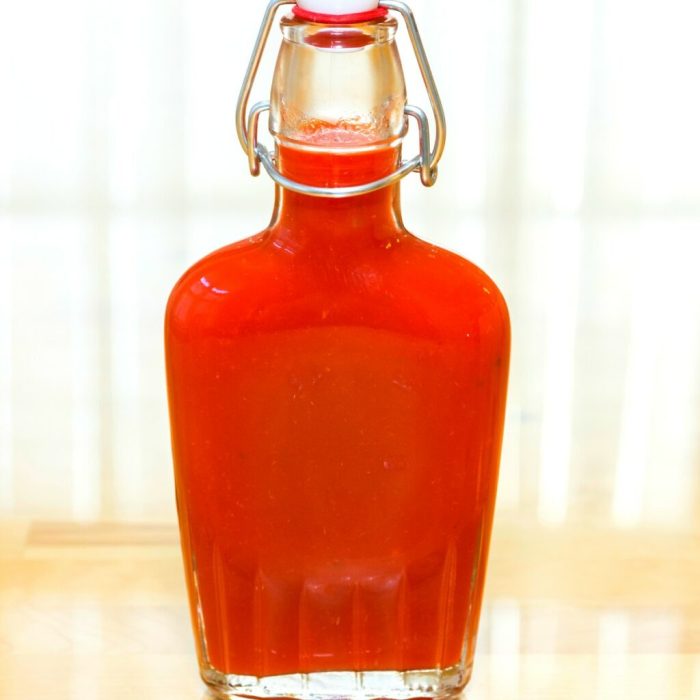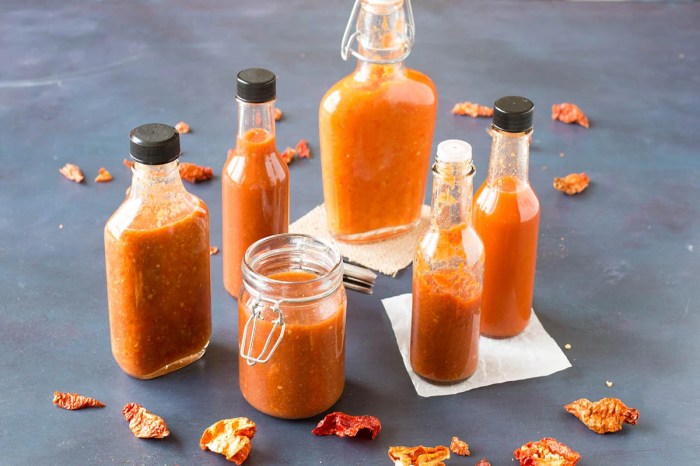Hot Louisiana Sauce Recipe A Flavorful Guide
Louisiana Hot Sauce: A Fiery Dive into Cajun Culture
Hot louisiana sauce recipe – Louisiana hot sauce, a staple of Cajun and Creole cuisine, is far more than just a condiment; it’s a testament to the region’s rich history, vibrant culture, and bold culinary spirit. This fiery elixir boasts a diverse range of flavors and heat levels, reflecting the unique blend of influences that have shaped Louisiana’s gastronomic landscape. From its humble beginnings to its current global recognition, Louisiana hot sauce continues to captivate taste buds and inspire culinary creativity.
Introduction to Louisiana Hot Sauce

Source: cookingfrog.com
Louisiana hot sauce’s origins are deeply intertwined with the state’s agricultural heritage and the resourceful nature of its people. Early versions likely utilized readily available ingredients like peppers, vinegar, and local spices. Over time, diverse pepper varieties and unique flavor combinations evolved, reflecting the varied cultural influences present in Louisiana. The cultural significance is immense; hot sauce is more than just a condiment; it’s a symbol of Louisiana’s fiery personality and a vital component in countless dishes, adding depth, complexity, and a signature kick.
The range of pepper varieties used is vast, encompassing both mild and intensely spicy peppers, leading to a spectrum of flavors and heat levels to satisfy every palate.
Key Ingredients and Their Roles
The foundation of any great Louisiana hot sauce lies in the careful selection and proportioning of its key ingredients. Typically, this includes a variety of peppers, vinegar, and often spices such as garlic, onion, and salt. The peppers, of course, provide the characteristic heat, with the type and quantity directly influencing the overall spiciness. Vinegar acts as a preservative and adds a tangy counterpoint to the heat, while spices contribute depth and complexity to the flavor profile.
Different vinegars, such as white wine vinegar, apple cider vinegar, or rice vinegar, each impart unique nuances, affecting the final product’s acidity and overall taste. For instance, apple cider vinegar might lend a subtly sweet note, while white wine vinegar offers a sharper, more acidic bite.
Recipe Variations and Styles
The beauty of Louisiana hot sauce lies in its versatility. Countless variations exist, each with its own distinct personality. The following table showcases three distinct recipes, ranging in heat level from mild to scorching:
| Name | Pepper Type | Ingredients | Heat Level |
|---|---|---|---|
| Mild Cajun Kiss | Banana Peppers, Poblano Peppers | Banana peppers, poblano peppers, apple cider vinegar, garlic, onion, salt, sugar | Mild |
| Classic Louisiana Fire | Cayenne Peppers, Jalapeños | Cayenne peppers, jalapeños, white wine vinegar, garlic, onion, salt | Medium |
| Inferno Louisiana | Scotch Bonnet Peppers, Habaneros | Scotch bonnet peppers, habaneros, white wine vinegar, garlic, onion, salt | Extreme |
A beginner-friendly mild Louisiana hot sauce can be crafted using a blend of sweet peppers like bell peppers and milder varieties like Anaheim peppers. A super-hot version might incorporate ghost peppers or Carolina reapers, requiring careful handling and potentially the use of gloves.
Making the Sauce: Step-by-Step Process

Source: akamaized.net
Creating Louisiana hot sauce is a rewarding process that allows for personalized flavor adjustments. Follow these steps for a classic recipe:
- Clean and prepare the peppers: Wash peppers thoroughly, remove stems and seeds (adjust seed quantity for desired heat level). Wear gloves, especially with hotter peppers.
- Rough chop the peppers and other ingredients (garlic, onion).
- Combine the ingredients in a pot and simmer until peppers are softened.
- Blend the mixture using an immersion blender or food processor until desired consistency is reached.
- Strain the sauce (optional) to remove seeds and skins for a smoother texture.
- Simmer the sauce for an additional 15-20 minutes to reduce and thicken.
- Pour into sterilized jars and store properly.
Preservation and Storage Techniques

Source: chilipeppermadness.com
Proper preservation is crucial for extending the shelf life and maintaining the quality of your homemade hot sauce. Sterilizing jars and bottles using boiling water or a steam sterilizer is essential to prevent spoilage. Store the sauce in airtight containers in a cool, dark, and dry place. Refrigeration is recommended for optimal flavor and longevity. Properly stored, your hot sauce can last for several months, sometimes even longer.
Serving Suggestions and Pairings, Hot louisiana sauce recipe
Louisiana hot sauce is a culinary chameleon, complementing a wide array of dishes. It elevates simple eggs, adds a fiery kick to grilled meats, and enhances the flavors of soups, stews, and even cocktails. Consider pairing it with classic Cajun and Creole dishes like jambalaya, gumbo, and crawfish étouffée. A menu showcasing its versatility could include: Spicy Shrimp Scampi, Hot Sauce Glazed Chicken Wings, and a fiery Bloody Mary.
Visual Guide to Pepper Types
Three common pepper types in Louisiana hot sauces each offer unique visual and flavor characteristics:
Cayenne peppers are typically slender and pointed, ranging in color from bright red to orange. They offer a moderate heat with a slightly fruity flavor.
Jalapeños, known for their slightly curved shape, vary in color from green to red as they ripen. Their heat is moderate to medium, with a slightly grassy flavor.
Habaneros, with their blocky shape and vibrant orange or red color, are renowned for their intense heat and fruity-sweet flavor profile.
Essential Questionnaire: Hot Louisiana Sauce Recipe
Can I adjust the heat level in the recipes?
Absolutely! The amount of pepper used directly impacts the heat. Start with less and gradually add more to your preferred level of spiciness.
How long does homemade hot sauce last?
Properly stored in sterilized jars in a cool, dark place, homemade hot sauce can last for up to a year. Always check for spoilage before consumption.
What if my sauce is too thick or too thin?
Crafting a truly fiery hot Louisiana sauce requires a delicate balance of peppers and spices. For a contrasting flavor profile, consider incorporating elements from an entirely different cuisine, perhaps using the sweetness and umami found in a hoisin sauce recipe easy as a surprising counterpoint to the heat. The resulting complexity in your Louisiana hot sauce will undoubtedly be intriguing.
Adjust the consistency by adding more vinegar for thinner sauce or simmering it longer for a thicker sauce.
Can I use different types of vinegar?
Yes, different vinegars impart unique flavor profiles. Apple cider vinegar adds sweetness, while white vinegar provides a sharper taste. Experiment to find your preference.
















